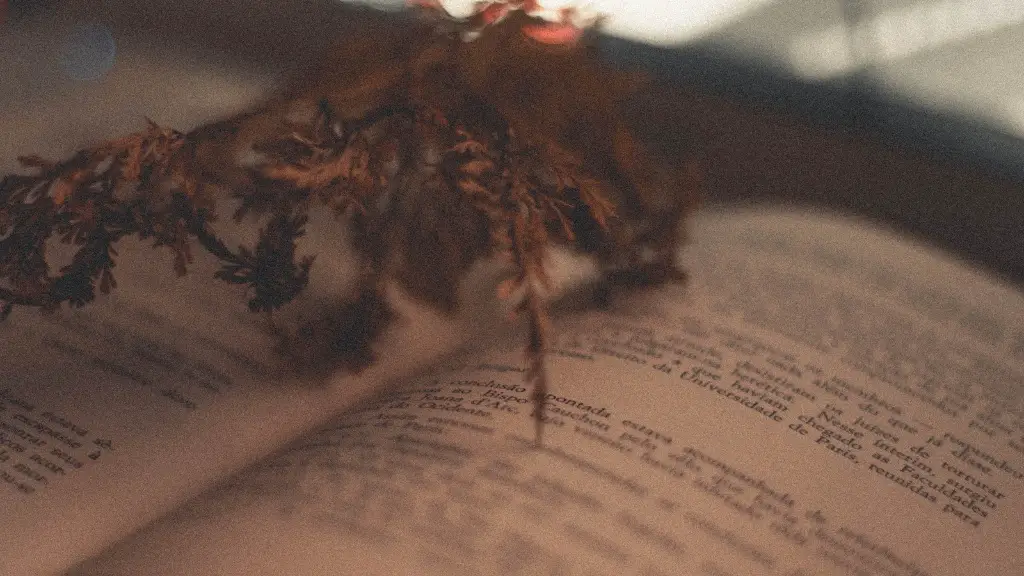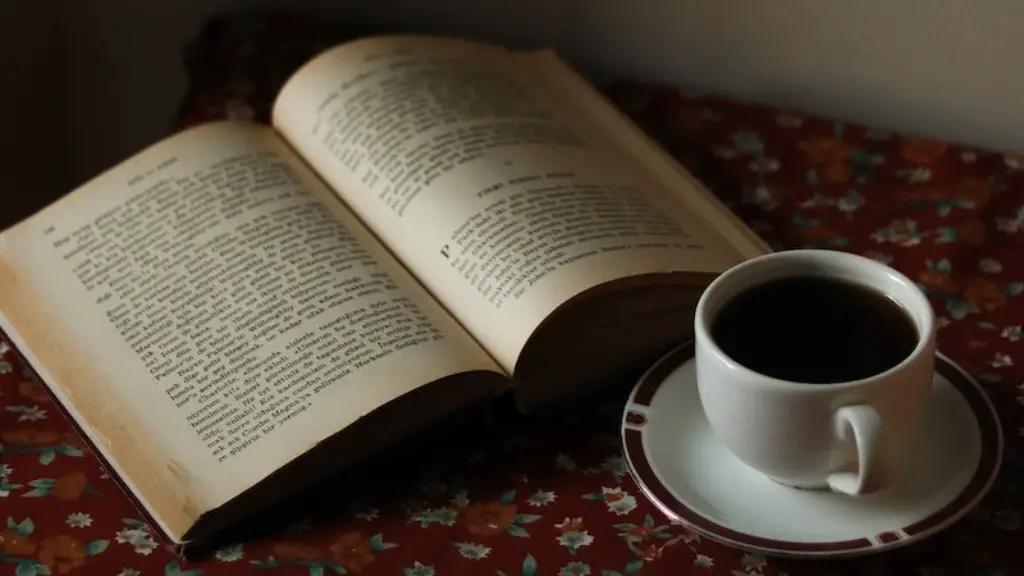Poetry is one of the most powerful forms of artistic expression, with the capacity to convey powerful emotions, as well as a range of complex ideas. A single verse in a poem can transport the reader to a different realm of thought and experience, leaving them with an indelible mark and often a profound insight into the author’s opinion. Verses in poetry often have a profound and lasting impact, providing an intimate connection between the words and the emotions that they evoke.
At its core, poetry consists of words, arranged to form verses that are used as a tool to tell stories from the poet’s perspective. Through its use of imagery, figurative language, and symbolic references, poetry can transcend the literal meaning of words and convey subtle nuances or abstract thoughts. In a single line or two, the poet can express an emotion, challenge a preconceived notion, or offer a refreshing perspective on a familiar topic.
In order to create an effective verse in poetry, the author must first identify an appropriate structure. This structure will determine the overall flow of the poem, as well as the type and length of words that are used. There are various forms of poetic structure, such as the rhymescheme or meter, which can be used to create specific patterns when reading the poem. Furthermore, specific types of images and symbolism can be used to further explore the hidden meanings behind the words.
Once the structure is established, the poet must choose suitable words and images that articulate their thoughts and feelings. The use of precise and precise language is critical for optimizing the potential of the verse. Additionally, the author can use figurative language, such as similes, metaphors, and personifications, in order to convey more complex ideas. In addition to these writing techniques, the poet can usesound effects, syllabic patterns, and pauses to further emphasize the desired effect.
The most compelling verses in poetry often draw upon the reader’s own experiences in order to evoke specific emotions. By creating a vivid image or metaphor that resonates with the reader on a personal level, the poet can effectively portray a unique perspective or insight. In order to achieve this effect, the author must be willing to experiment with language and structure to find the right combination that resonates with the target audience.
Since the beginning of time, poetry has been a source of inspiration and wonder, invoking powerful emotions in readers. A single verse in poetry can leave a lasting impression, offering a unique insight into the author’s thoughts and feelings. By leveraging a suitable structure and taking advantage of precision language, imagery, figurative language, and personal experiences, poets can create moving verses that stand the test of time.
The Artistry of Poetry
The artistry of poetry lies in the ability of the writer to capture a profound sentiment and deliver it with a beaming intensity. This is particularly true for verses in poetry, where the selected words and poetic structure must be carefully crafted in order to convey a specific message. The message must be concise, yet emotive and thought-provoking; transporting the reader to a realm of creative contemplation and sensation. In order to achieve this effect, the poet must be willing to experiment with different techniques and approaches, creating particular styles that define their own unique artistic expression.
Furthermore, the poet must be mindful of the effect that they intend to achieve. The way a verse is crafted and the subtle nuances that it conveys can often determine how the reader perceives the message. Consequently, the poet should take the time to explore different concepts and perspectives, developing an understanding of their own worldview and the feelings that they wish to evoke. By doing so, the poet can ensure that their chosen structure, language, and imagery all work together in harmony to create a powerful experience that resonates with the reader.
Moreover, the poet should consider the way in which the verse is read, as well as the rhythm and cadence of their words. While the reading of a verse may seem straightforward, there is an innate rhythm to poetic words that must be transcribed in order to fully capture the sentiment behind the verse. The poet should take the time to read their words aloud and consider how pauses, sound effects, and various wordplay can be used to elevate their work and optimize its emotional impact.
By making use of a combination of powerful writing techniques, poets can create memorable verses that transport the reader to a realm of emotion and thought. Furthermore, by taking the time to consider their approach and the intended outcome, poets can create verses that stand the test of time; offering a lifetime of inspiration and enlightenment.
The Impact of Poetry
The impact of poetry cannot be underestimated; its powerful words can move people to laughter and tears, inspire deep thoughts and passionate discussions, and ultimately reshape the way people think, feel, and perceive the world around them. A single verse in poetry can be the spark of an entire train of thought, leading to a newfound understanding or renewed perspective. Verses, when expertly crafted by poets, can create an emotional attachment between the words and their readers, intensifying the emotional reaction and often inspiring an intellectual curiosity in those that experience it.
In recent years, poetry has become increasingly popular, finding new adoration amongst a younger generation of readers and writers. The power of the medium has been amplified by the accessibility of the works, as well as a renewed appreciation for the craftsmanship and artistry behind the words. Furthermore, the growth in online platforms, such as Instagram, Twitter, and YouTube, have served as vehicles to spread its message, reaching many more potential readers than ever before.
Poetry is a universal language that transcends cultural and physical boundaries, allowing the reader to explore a range of subjective ideas in relative safety. Its power resides in its ability to make the intangible tangible, conveying the intangible emotions within a single verse. Thus, verses in poetry have the potential to offer an insight into the author’s thoughts and feelings, leaving the reader with a newfound understanding or an altered perspective.
The power of poetry also lies in its ability to bring people together. By providing a platform for people to express their feelings and ideas, poetry serves as a catalyst for meaningful conversations and exchanges of opinion. This can be liberating for many, offering an external source of validation and appreciation, while also connecting people to like-minded individuals, who can offer their own perspectives and an open dialogue.
The Challenge of Writing Poetry
Despite its rewarding outcome, writing poetry can be a daunting task for many. Crafting the individual verses and creating an effective poem requires a certain set of skills; both writing and editing. Furthermore, the poet must consider the way in which the words and structure will blend together to form a cohesive narrative, and choose the words that best capture the intended sentiment.
The challenge is accentuated when the poet is trying to convey powerful emotions and ideas that may not be easily translated into words. Furthermore, the poet must find a structure that both reflects the message and enables its optimal reading. This can often require multiple revisions, careful consideration, and experimentation, to reach a satisfactory outcome.
In addition, this process can be difficult to replicate. What works for one poem may not work for the next, and the poet may need to take a completely different approach to create the desired effect. Thus, poets must be willing to explore several avenues, often stepping out of their comfort zone, to identify the words and structure that work best.
The Power of the Written Word
Poetry can be particularly empowering, allowing amateur writers to curate a voice, explore their identity, and express their emotions. By exploring a range of writing techniques and utilizing a suitable structure, the poet can unearth powerful ideas that may have been previously hidden. This can be liberating, allowing the poet to discover new avenues of thought and foster a newfound appreciation for their own creativity.
Furthermore, the poet can find solace in their words, forming a personal connection with the poem. This connection can provide the poet with an effective outlet for their emotions and ideas, enabling them to share their honest sentiments with an eager audience. In many cases, the poem can remain an open book that continues to unravel its hidden meanings over time, becoming a timeless piece of expression.
Poetry also offers a unique platform for communicating difficult topics or raising awareness of simpler topics. By utilizing powerful writing techniques and carefully choosing their words and structure, the poet can effectively attract attention and provoke action. Through the creative use of language and images, the poet can bring to light even the most sensitive of topics, helping to shape the opinions of others.
The power of the written word is an invaluable asset to anybody involved in the art of writing. It affords us the ability to capture a fleeting sentiment and use it to move people to action, inspire discussions, and shift the way in which we perceive our world. By exercising patience and embracing the challenge of writing poetry, poets can create verses that stand the test of time; offering a lifetime of insight and connection.
The Evolving Nature of Poetry
Poetry is an ever changing art form, constantly evolving with its various readerships and writers. Consequently, poets must be flexible and willing to adapt their own style, whilst retaining the spirit of their writings. New techniques, platforms, and approaches can all be incorporated into the craft, creating a refreshing outlook that furthers the appreciation of the genre.
Digital media has played a pivotal role in the evolution of poetry, making it easier for poets to reach a wider audience. This has led to an influx of new writers, producing work that reflects a multitude of perspectives and experiences. Consequently, the range of content has become diverse, with a vast array of styles, approaches, and mediums now available.
Furthermore, the rise of democratized platforms, such as Instagram and Twitter, has enabled more writers to be recognized. This has encouraged poets to write more freely, offering outsiders a unique opportunity to explore and admire their work, often with immediate responses and appreciation.
At the same time, established poets are beginning to experiment with their own style, finding new ways to blend their existing techniques with contemporary approaches. To accommodate this, some poets arepublishing their work in digital formats, offering readers an interactive experience, as well as audio and visual elements.
Overall, the evolution of poetry offers a unique prospect for poets and readers alike. By exploring the changing landscape, poets can create powerful verses that remain relevant and inspiring to future generations.





